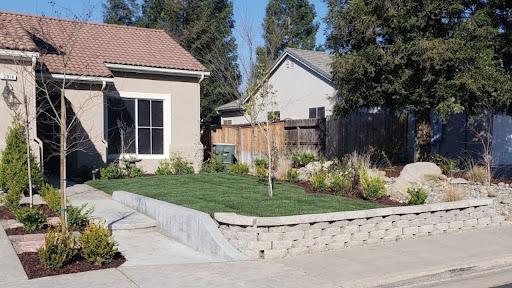BLOGS

What Are Some Eco-friendly Landscaping Practices To Consider?
Eco-friendly landscaping practices include using native and drought-tolerant plants, incorporating mulch to retain soil moisture and suppress weeds, installing rainwater harvesting systems, using permeable paving materials, and creating habitats for local wildlife.
Creating an eco-friendly landscape involves adopting sustainable practices that enhance the beauty of outdoor spaces while minimizing environmental impact. At Ultimate Landscape & Tree Service, we believe implementing these methods can lead to a more resilient and vibrant garden. Here are some key eco-friendly landscaping practices to consider for a greener and more sustainable yard.
Key Takeaways
Choose native plants to enhance local biodiversity and reduce maintenance.
Implement water conservation techniques such as rainwater harvesting and smart irrigation.
Use composting and mulching to improve soil health and reduce waste.
Opt for eco-friendly hardscaping materials to minimize environmental impact.
Create wildlife-friendly habitats to support local ecosystems.
Maintain healthy soil to promote plant growth and reduce irrigation needs.
Key Eco-Friendly Landscaping Practices for a Sustainable Garden
Native Plant Selection
Choosing native plants is crucial for sustainable landscaping. These plants are well-adapted to local soil and climate conditions, requiring less water, fertilizer, and maintenance. They also provide essential habitats for local wildlife and support biodiversity, making them a sustainable choice for any garden.
Water Conservation Techniques
Implementing water-saving measures is vital in eco-friendly landscaping. Some effective strategies include:
Harvesting Rainwater: Collecting rainwater through barrels or cisterns can significantly reduce reliance on municipal water sources, especially in drought-prone areas.
Drought-Resistant Plants: Incorporating drought-tolerant species helps conserve water, as these plants are designed to thrive with minimal irrigation.
Smart Irrigation Systems: Utilizing technology that adjusts watering schedules based on weather conditions can prevent overwatering and reduce water waste.
Composting and Mulching
Composting organic waste not only reduces landfill contributions but also enriches soil health, promoting better plant growth. Mulching with organic materials helps retain soil moisture, suppress weeds, and improve soil quality as it decomposes.
Eco-Friendly Hardscaping
When selecting materials for paths, patios, or garden beds, opt for sustainable options such as recycled materials or locally sourced stone. Permeable paving solutions can also enhance water infiltration and reduce runoff, contributing to a healthier ecosystem.
Wildlife-Friendly Practices
Creating habitats for wildlife is an essential aspect of sustainable landscaping. This can include installing birdhouses, bee hotels, and butterfly gardens, as well as avoiding the use of harmful pesticides. Integrated Pest Management (IPM) techniques can help control pests naturally without relying on chemicals.
Soil Health
Maintaining healthy soil is foundational to sustainable landscaping. Regularly testing soil for nutrients and pH levels, and amending it with organic matter like compost, can enhance fertility and promote plant health. Healthy soil also improves water retention, reducing the need for frequent irrigation.
The Benefits of Native Plants in Landscaping
Native plants are an excellent choice for eco-friendly landscaping due to their adaptability to local climates and soil conditions. Unlike non-native species, native plants require less water and fewer fertilizers, making them a low-maintenance option that is also cost-effective. These plants have evolved to thrive in specific environmental conditions, which means they are better suited to handle local pests and diseases, reducing the need for chemical interventions. Additionally, native plants provide essential habitats for local wildlife, such as birds, insects, and pollinators, contributing to biodiversity and a healthier ecosystem. By incorporating native species into your garden, you can create a vibrant, sustainable outdoor space that supports local wildlife and requires minimal upkeep.
Key Benefits:
Reduced need for water and fertilizers
Lower maintenance requirements
Support for local wildlife and biodiversity
Better resistance to local pests and diseases
How to Implement Smart Irrigation Systems
Smart irrigation systems offer a sophisticated approach to water conservation in landscaping. These systems utilize advanced technology, including sensors and weather data, to optimize watering schedules and ensure that plants receive the precise amount of water they need. By adjusting watering based on real-time weather conditions, smart irrigation systems can prevent overwatering, reduce water waste, and help maintain a healthy garden even during dry spells. These systems can also be controlled remotely, allowing homeowners to manage their irrigation needs from their smartphones. Investing in smart irrigation can lead to significant savings on water bills and contribute to a more sustainable and efficient garden.
Key Features:
Sensors for real-time weather data
Adjustable watering schedules
Remote control via smartphone apps
Reduction in water waste and utility bills
Composting for a Healthier Garden
Composting is a sustainable practice that transforms organic waste into valuable nutrients for your garden. By composting kitchen scraps, yard clippings, and other organic materials, you create nutrient-rich humus that enhances soil fertility and structure. This natural fertilizer improves soil health, promotes robust plant growth, and reduces the need for chemical fertilizers. Composting also helps divert organic waste from landfills, reducing greenhouse gas emissions and contributing to environmental sustainability. By incorporating composting into your gardening routine, you can enrich your soil, support plant health, and make a positive impact on the environment.
Key Advantages:
Enhances soil fertility and structure
Reduces reliance on chemical fertilizers
Decreases landfill waste
Promotes robust plant growth
Designing Wildlife-Friendly Gardens
Creating a wildlife-friendly garden involves designing a space that attracts and supports beneficial insects, birds, and other wildlife. This can be achieved by incorporating a variety of native plants that provide food and shelter for local creatures. Adding water features like birdbaths or small ponds can offer essential drinking and bathing spots. Installing shelters such as birdhouses, bee hotels, and butterfly gardens can further enhance the habitat. Avoiding harmful pesticides is crucial, as they can negatively impact beneficial wildlife. A well-designed wildlife-friendly garden not only supports biodiversity but also adds beauty and interest to your outdoor space throughout the year.
Key Strategies:
Use native plants for food and shelter
Include water features for hydration
Provide shelters like birdhouses and bee hotels
Avoid pesticides to protect wildlife
The Importance of Soil Testing in Landscaping
Soil testing is a vital step in creating a successful and sustainable landscape. By analyzing soil samples, you can determine the levels of essential nutrients and the pH balance of your soil. This information allows you to make informed decisions about soil amendments, such as adding compost or adjusting pH levels, to optimize plant health. Regular soil testing helps identify nutrient deficiencies or imbalances that could affect plant growth and overall garden performance. Properly amended soil enhances water retention, supports robust plant development, and reduces the need for chemical fertilizers. Soil testing ensures that your garden receives the nutrients it needs to thrive.
Key Benefits:
Identifies nutrient deficiencies and imbalances
Informs decisions on soil amendments
Enhances water retention and plant health
Reduces reliance on chemical fertilizers
FAQs
Why are native plants better for the environment? Native plants are adapted to local conditions, requiring less water, fertilizers, and pesticides. They support local wildlife and promote biodiversity.
How can I conserve water in my garden? Use drought-resistant plants, install a rainwater harvesting system, and implement smart irrigation to conserve water effectively.
What is the benefit of using compost in my garden? Compost enriches the soil with nutrients, improves soil structure, and enhances moisture retention, promoting healthier plant growth.
How can I make my garden wildlife-friendly? Plant native species, provide water sources, install shelters like birdhouses, and avoid using harmful pesticides to create a wildlife-friendly garden.
Why is soil health important in landscaping? Healthy soil supports robust plant growth, improves water retention, and reduces the need for chemical fertilizers, contributing to a sustainable garden.
Transform Your Outdoor Space with Ultimate Landscape & Tree Service
Incorporating eco-friendly landscaping practices not only contributes to environmental sustainability but also creates a vibrant and resilient outdoor space. By focusing on native plants, water conservation, composting, eco-friendly materials, and wildlife support, homeowners can significantly reduce their ecological footprint while enjoying a beautiful landscape.
Contact us now at Ultimate Landscape & Tree Service! Our team of experienced professionals in Fresno, CA, is dedicated to creating beautiful, sustainable landscapes that meet your needs. We are here to help you implement these sustainable practices, ensuring your garden thrives for years to come.

Contact Us
Monday - Friday: 9am - 5pm
Saturday: Closed
Sunday: Closed
Connect With Us
Financing Available
© 2025 Ultimate Landscape & Tree Service LLC. All Rights Reserved. Privacy Policy. Terms & Conditions. Web Design By Fused Media.
